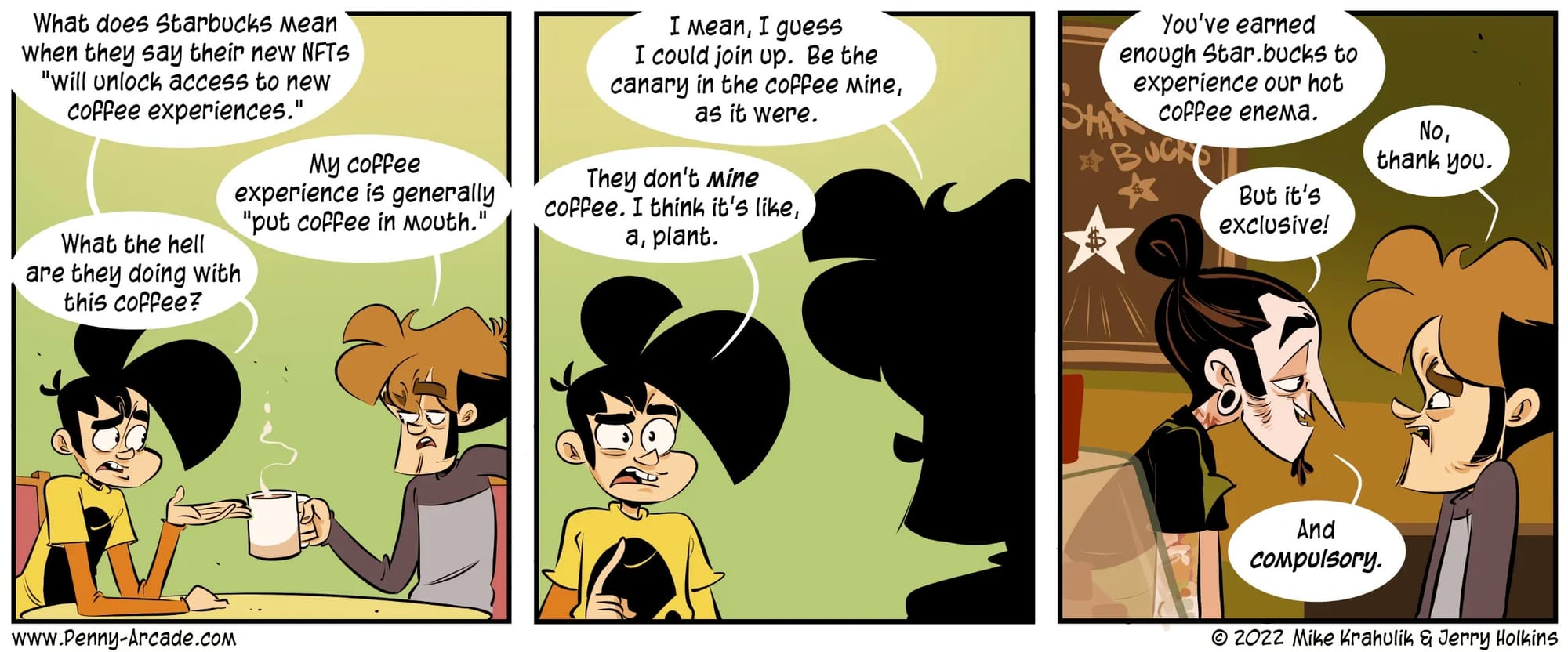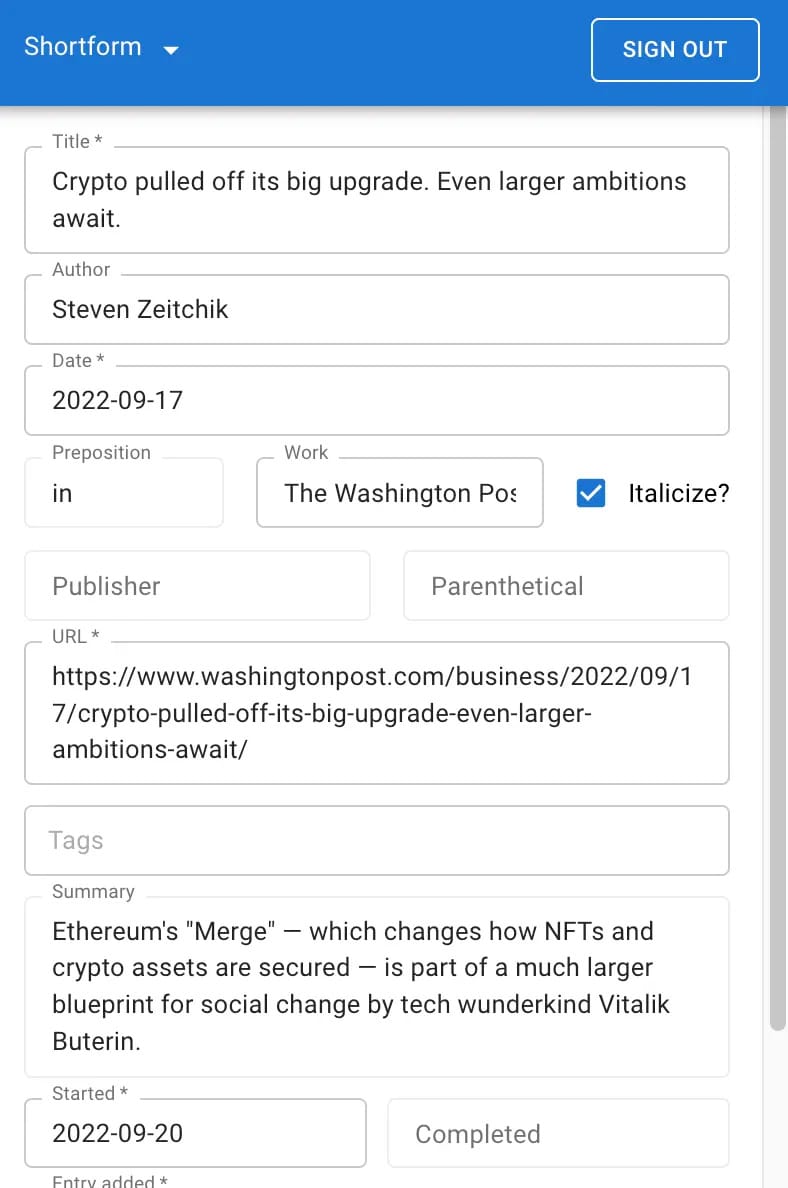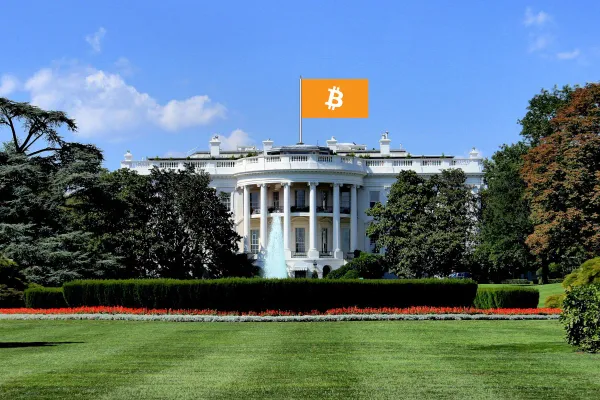Issue 4 – The Ethereum Merge, Purge, Scourge, and Dirge
Immersive coffee experiences, Helium shortages, and a Do on the go

Hello and welcome to another issue!
Coming up
I'll be giving a guest lecture on web3 this week at the University of Texas at Austin for a course that explores solutionism. As I try to do with "paywalled" events, I've gotten the okay to republish the recording after the fact, so keep an eye out for that.
The House Agriculture Committee has a hearing on "Assessing Crypto as a Tool for Financial Inclusion" at 2pm ET on September 20. I'm not participating in it, but I'll certainly be watching—as can you, if you're interested. If you're wondering why on earth the Ag Committee cares about crypto, it's not because of some corn-but-on-the-blockchain idea—they are in charge of regulating commodity markets, and some cryptocurrencies may be classified as commodities. This meeting was apparently postponed at the last minute.
I will be speaking at Web Summit 2022 in Lisbon (!) in November. There will be quite a contingent of crypto folks there, including Changpeng Zhao (aka CZ, founder & CEO of Binance), Nicole Muniz (CEO of Yuga Labs, the company behind Bored Apes), and founders of various other blockchains including Polygon, Tezos, Cardano, and Aave. The crypto skeptic contingent is quite light (at least at this point—I think more speakers are still being added), but I'll do my best.
In the news
Pranshu Verma writes about the surge of queen-themed crypto tokens and NFT projects that emerged after her death. I talk about how all of crypto is predicated on getting people to believe that a token's value will go up, and trying to create a "viral" token based on a cultural phenomenon is a good example of that.
Steven Zeitchik asks "what's next?" after the Ethereum Merge. I talked a little bit about my concerns with Vitalik Buterin's thinking, which often seems enormously idealistic and lacking in consideration for the potential of misuse. David Gerard is in there too, expressing similar concerns to mine, including that Soulbound NFTs are "literally a Black Mirror episode".
I joined as the last of several guests on this episode, which explores crypto mining in Kazakhstan, crypto usage in and donations to Ukraine, and Bitcoin in El Salvador.
The crypto overview
The long-awaited Ethereum Merge has happened, and Ethereum is now proof-of-stake! A lot of people were holding their breath around this, because it's a pretty huge change to make to a system that has somehow wound up with a serious amount of money floating around in it. Some have likened it to swapping a plane engine out in midair, and some feared that a catastrophic bug could result in the network suddenly grinding to a halt, or massive quantities of ETH being drained. Needless to say that didn't happen (or at least, it hasn't at the time of writing), and things went quite smoothly. Ethereum now uses 99% less energy than it did prior to the Merge, when it was using about as much electricity annually as the country of Finland. Unfortunately, none of Ethereum's planned future upgrades—cutely termed things like the "Surge" and the "Verge"—will help much with the fact that it remains a highly volatile speculative asset upon which people are building scams and predatory "investment" schemes.
The long-running lawsuit by the U.S. Securities and Exchange Commission against Ripple may be drawing to a close. The SEC filed a lawsuit against Ripple almost two years ago now, claiming that their sale of the XRP token constituted an unregistered securities offering. The two have been locked in a fierce battle since, with Ripple maintaining that XRP doesn't meet the definitions of a "security" as described by the Howey test. Now, both parties have filed motions for summary judgment, which means they believe the judge has enough information to rule on the case without going to trial.
The Web3 is Going Just Great recap
Note: If you're a dutiful follower of the W3IGG site and don't need a recap, you can scroll on past to the "Week in review" section.
There were 17 new entries between September 8 and September 19, averaging 1.4 posts a day.
Binance takes a $19 million hit due to Helium accounting bug
[link]
Something apparently fell through the cracks over at Binance, because when Helium added their new MOBILE token, their system considered it to be identical to Helium's existing token, HNT. This meant that whenever someone deposited a MOBILE token into Binance, they received an HNT token—which is a big deal given that Helium trades somewhere between $4 and $7, and MOBILE doesn't have any liquid market at all, but is estimated to be worth somewhere under 0.001 HNT (so <$0.01).
Four wallets deposited a combined 4.8 million MOBILE onto Binance, and were credited the same number of HNT tokens—almost the entire amount Binance had in their primary wallet. They then sold off many of these tokens, resulting in a dip in Helium prices, and leaving Binance with a loss of the equivalent of around $19 million.
Do is on the go
[link]
South Korea issued an arrest warrant for Do Kwon, the founder of the ill-fated Terra ecosystem. Kwon is believed to be in Singapore, as are the five others also named in the arrest warrant. Kwon tweeted that "I am not 'on the run' or anything similar", later joking, "Tbh havent gone running in a while, need to cut some calories". South Korean prosecutors don't seem to think it's such a laughing matter, telling media that he is "obviously on the run" and asking Interpol to issue a red notice.
Starbucks wants to sell you NFTs digital collectible stamps
[link]
It's hard to say whether Starbucks actually thinks NFTs are the future, or they're just trying to distract from the headlines over their egregious union busting, but they've announced that they'll be incorporating NFTs into their loyalty program. In the press release, they go to conspicuous lengths to avoid using the term "NFT", preferring instead to call them "digital collectible stamps"—somehow making them sound even less cool (no offense to any stamp collectors out there). They also describe how they intend to enable "immersive coffee experiences" among their fans, which sounds like a decidedly painful affair.

The Coinbase app gets political
[link]
When the "politics" were widespread civil unrest in the summer of 2020 triggered by the police murder of George Floyd, and pressure on the company to release a statement in support of Black Lives Matter, Coinbase CEO Brian Armstrong announced that there would be no political discussion or activism at work, and those who didn't like it could leave. Now, he's just announced that Coinbase will be "integrating our crypto policy efforts right into our app" by providing a rating of politicians' negative or positive "crypto sentiment".
The project uses ratings from the Crypto Action Network website, which gives politicians A–F letter grades for their cryptocurrency policy stances. In the Senate, Senators Ted Cruz (R-TX), Kirsten Gillibrand (D-NY), Cynthia Lummis (R-WY), Rob Portman (R-OH), Pat Toomey (R-PA), and Ron Wyden (D-OR) earned A ratings. Senator Elizabeth Warren (D-MA) earned the only F. Over in the House, Representative Brad Sherman also received the only F, a grade that was probably well-earned given his recent keynote address to the Crypto Policy Symposium, where he described crypto as "the pet rock of the 21st century, a scheme that would make Mr. Ponzi blush".
Everything else
- Sparkster settles for $35 million with the SEC; SEC charges crypto influencer [link]
- UK financial regulator warns against FTX exchange [link]
- Scammer earns 13 ETH ($17,500) from fake Mutant Ape scheme [link]
- Whale illustrates price manipulation risk in GMX exchange, profits more than $400,000 [link]
- Hours after Ethereum transition to proof-of-stake, SEC Chair says PoS crypto could be classed as securities [link]
- Vulnerability discovered in vanity wallet generator puts millions of dollars at risk [link]
- "Double your money" scammers capitalize on Ethereum merge [link]
- Ubisoft now claims its forceful introduction of NFTs was only "research" [link]
- Algorand Foundation discloses $35 million exposure to Hodlnaut [link]
- New Free DAO loses $1.25 million in flash loan attack [link]
- Shiba Inu developers leak AWS credentials on Github [link]
- Coinbase funds lawsuit against the Treasury Department over Tornado Cash sanctions [link]
- Crypto reacts to Queen Elizabeth's death [link]
Week in review
I had a couple of interesting conversations with some legislative staffers focusing on cryptocurrency regulation, which are always interesting and informative. There's definitely some smart people working on the issue, though I don't envy them what they're up against in terms of lobbyists and the difficulty in getting other legislators to even understand the basics around the topic.
I finally put in some time this week to finish up a major improvement to my reading list workflow. As some of you have probably discovered, I keep pretty extensive lists of what I'm reading (and watching and listening to) on my website. Now I don't have to manually enter each piece into gigantic JSON files, and I instead store it in a database I can update with a snazzy Chrome extension that fills in most of the details for me. It was a pain remembering to add stuff to the JSON file and push it to git, so I ended up leaving a lot of good content off of the lists.

I also spent a long time tracing a "double-your-money" scam ring that was promising free Ethereum to "celebrate the Merge", and put in some more work on a tool that I'm working on to help me analyze NFT thefts.
I've also been doing some more research into DAOs and how they aim to organize around "social good" projects. I've been wanting to examine the goals that I have in common with some in the web3 industry—orchestrating community-governed projects, returning power in the web from advertisers and tech behemoths to users, and increasing access to financial services and reducing wealth inequality—and try to understand how and why some believe that blockchain-based systems could provide a path to those goals. As web3 has emerged as a popular interest, there have been an influx of new people interested in these enormously important topics, and I believe it will be useful to learn from those pursuing that path—regardless of whether it results in working with them on endeavors that may be feasible, taking learnings from them to apply to non-web3 projects, or providing more well-formed critiques of web3 approaches that may be ineffective or even harmful. As a result of this, you may notice that I've updated my disclosures to reflect that I now own a very small amount of crypto—so many of these projects are token-gated, and I am finding it helpful to be able to interact with the projects to understand how they work and interact with their members a little more. There's more detail on the financial entanglement there, but TL;DR: I don't hold a significant amount and won't keep any returns if I stumble into them.
The weather has been beautiful and crisp, so Atlas and I have really put on the miles this week in walks. We've also been working on recall training, which I hope will enable him to go off-leash a little more often. We had a good training session this week practicing on crowded sidewalks, which also went well—some people who see him for the first time are very afraid of him just because of his size and breed(s), so we're practicing being extra polite (staying very close to my side, not trying to solicit pets) when he needs to be.

Worth a read
This Ethereum Merge thing is confusing and hard to understand, so the inimitable Bennett Tomlin breaks it down wonderfully for you… while also explaining the even more brain-melting potential futures of Ethereum, like danksharding.
CoinDesk published an excerpt from Rushkoff's latest book, which just published earlier this month. It's about how some tech billionaires are planning elaborate plans to survive The Event ("the environmental collapse, social unrest, nuclear explosion, solar storm, unstoppable virus or malicious computer hack that takes everything down") that seem to involve building fortresses to save them from the rest of humanity, rather than leaning into community to help in a crisis. I immediately ordered a copy of the book—not only does it sound like a fascinating read in terms of insights into weird billionaire survivalism fantasies, but he speaks to techno-solutionism and the broader tendency towards seeing "other human beings as the problem and technology as the way to control and contain them". He's also a captivating writer.
September marks the one year anniversary of El Salvador's adoption of Bitcoin as legal tender. As I said on the World Affairs show earlier this week, it absolutely proved the potential of Bitcoin as a state currency… in its spectacular failure.
Did you know…
That a Kermit is a 14.4-minute-long unit of time achieved by dividing a day into 100 equal units? Disappointingly, it has nothing to do with Muppets, but is in fact named after a Dr. Kerwin. "More precise time can be counted by dividing by 1000 or even 10000 but in 1983 life was not as hectic and 14.4 minutes or 1 Kermit was accurate enough for most people."
Now you know!
That's all for now folks. Until next time,
– Molly




